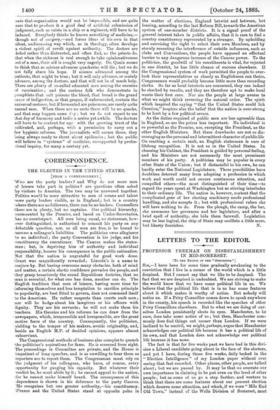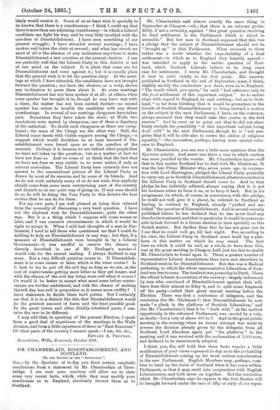LETTERS TO THE EDITOR.
PROFESSOR FREEMAN ON DISESTABLISHMENT IN MID-SOMERSET.
rTo THE EDITOR OF THE SPECT•TOR."] 8114-I have been for some time gradually awakening to the conviction that I live in a corner of the world which is a little despised. But I cannot say that we like to be despised. The fact that we are despised is undoubted. We are striving to make the world know that we have some political life in us. We believe that the political life that is in us has some features about it which makes it worthy of notice. But nobody will notice us. If a Privy Councillor comes down to speak anywhere in the county, his speech is recorded like the speeches of other Privy Councillors elsewhere. But to what we are doing of our- selves London persistently shuts its eyes. Manchester, to be sure, does take some notice of us ; but then, Manchester com- monly does find things out sooner than London. If we were inclined to be uncivil, we might, perhaps, argue that Manchester acknowledges our political life because it has a political life of its own, and that London does not acknowledge our political life because it has none.
The fact is that for five weeks past we have had in this divi- sion a Liberal candidate going about in the face of the electors, and yet I have, during those five weeks, daily looked in the "Election Intelligence" of my London paper without ever seeing that fact recorded. Other places, other people, are talked about ; but we are passed by. It may be that we overrate our own importance in claiming to be put even on the level of other people ; but as some of us go a step further, and venture to think that there are some features about our present election which deserve some attention, and which, if we were "Mile End Old Town," instead of the Wells Division of Somerset, most
likely would receive it. Some of us at least wish it specially to be known that there is a constituency—I think I could say that there is more than one adjoining constituency—in which a Liberal candidate can fight his way, and be very little troubled with the quettiou of Disestablishment. I have seen something of our present struggle ; I have attended several meetings ; I have spoken and taken the chair at several; and what has struck me most of all is the absence of any inclination anywhere to make Disestablishment a test question at the present election. I can see perfectly well that the Liberal Party in this district is not of one mind on the subject. It is plain that some are for Disestablishment and some against it ; but it is equally plain that the general wish is to let the question sleep. At the meet- ings at which I have attended, the candidates have not brought forward the question ; nor have the electors, as a body, shown any inclination to press them about it. At some meetings Disestablishment has not been spoken of at all; at others, when some speaker has brought it in, though he may have met with a cheer, the matter has not been carried further—no second speaker has arisen to trouble the candidate with any direct questionings. In several of our meetings clergymen have taken part. Sometimes they have taken the chair; at Wells two resolutions were moved by clergymen, one of them a dignitary of the cathedral. No doubt such clergymen as these are excep- tional; the mass of the Clergy are the other way. Still, the Liberal cause meets with visible support among the Clergy,—a support which would doubtless be at least lessened if Dis- establishment were forced upon us as the question of the moment. Perhaps it is because we are behind other people that we have not taken up the question ; but as a matter of fact we have not done so. And we some of us think that the fact that we have not done so may entitle us to some notice, if only as natural curiosities. The Liberal Party here certainly does not answer to the conventional picture of the Liberal Party as drawn by most of its enemies and by some of its friends. And we do not wish, certainly many of us do not wish, that anybody should come from some more enterprising part of the country and disturb us in our quiet way of going on. If any man should do so, he will be doing the Tory Party in this district the beat service that he can do for them.
For my own part, I am well pleased at being thus relieved from the necessity of discussing a very hard question. I have not the slightest wish for Disestablishment; quite the other way. But it is a thing which I suppose will come sooner or later, and I can conceive circumstances in which it would be right to accept it. When I still bad thoughts of a seat in Par- liament, I used to tell those who questioned me that I could do nothing to help on Disestablishment in any way; but that, if a measure of Disestablishment were brought in by a Liberal Government—it was needful to reserve the chance so cleverly described in one of Mr. Trollope's novels—I would vote for the second reading. I always declined to say more. But a very difficult question comes in. If Disestablish- ment is to come sooner or later, which is the wiser course ? Is it beat to try to put off the evil day as long as we can, at the cost of controversies getting more bitter as they get longer, and with the chance of the evil day being more evil when it comes ? Or would it be better to accept what must come before contro- versies are further embittered, and with the chance of making the evil day less evil in proportion as it comes more swiftly ? I leave statesmen to decide these hard points. But I certainly see that it is in a district like this that Disestablishment would do the greatest amount of harm and the least possible good. in the great towns and other thickly-inhabited parts, I con- ceive the case to be different.
I may add that, in speaking of the present Election, I speak from a good deal of experience of the meetings in the Wells division, and from a little experience of those in "East Somerset." Of other parts of the country I cannot speak.—I am, Sir, &C., EDWARD A. FREEMAN.
Somerlease, Wells, Somerset, October 20th.



































 Previous page
Previous page